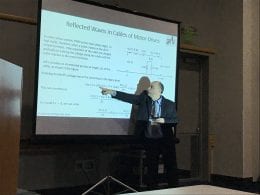MANHATTAN — The Johnson Cancer Research Center at Kansas State University has launched a Center of Excellence for Pancreatic Cancer Research. The center has three areas of focus: cancer detection, drug discovery and studies involving in-vivo techniques and magnetic resonance imaging.
The center is led by Stefan Bossmann, professor of chemistry. The focus areas are led by, respectively, Jun Li, professor of chemistry; Duy Hua, university distinguished professor of chemistry; and Jianzhong Yu, assistant professor of anatomy and physiology.
Pancreatic cancer is the third-deadliest cancer in the U.S. Most pancreatic cancers are diagnosed late due to the absence of symptoms. Only 1 percent of people diagnosed at stage IV live another five years.
“Sadly, pancreatic cancer survival rates have remained unchanged in the past decade,” Bossmann said. “New strategies for detection and treatment are urgently needed.”
A major goal of the center is to make earlier detection possible by developing inexpensive liquid biopsy methods that enable frequent and routine testing for onset or recurrence of pancreatic cancer.
A second goal is to develop new drug therapies using cutting-edge chemical synthesis and characterization methods, expert nanotechnology, state-of-the-art in-vitro experimentation and ultra-high-field MRI methods.
“We are excited to fund this center of excellence that brings together outstanding K-State scientists to attack one of the world’s toughest cancers as a multidisciplinary team,” said S. Keith Chapes, interim director of the Johnson Cancer Research Center. “We thank our supporters for making it possible to implement this next step in our strategic plan to become a National Cancer Institute-Designated Basic Laboratory Cancer Center.”
“This Center of Excellence for Pancreatic Cancer Research is an exciting step forward in K-State’s fight against cancer,” said Richard Myers, Kansas State University president. “Moreover, it supports our 2025 vision to be recognized as a Top 50 public research university and our goal, as a land-grant university, to improve the quality of life for all through research.”
Other scientists involved in the center of excellence are Thomas Mueller, research assistant professor of biology; Om Prakash, professor of biochemistry and molecular biophysics; Punit Prakash, associate professor of electrical and computer engineering; Chris Culbertson, professor of chemistry; Tej Shrestha, laboratory coordinator in anatomy and physiology; and Matthew Basel, clinical assistant professor in anatomy and physiology. Supporting their work with pancreatic cancer biospecimens will be Anup Kasi, associate professor at the University of Kansas Medical Center.
The Johnson Cancer Research Center, in the College of Arts and Sciences, supports and advances cancer research and education at Kansas State University. All of its programs are made possible by private funding. Information about the center is at cancer.k-state.edu.



